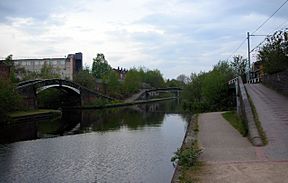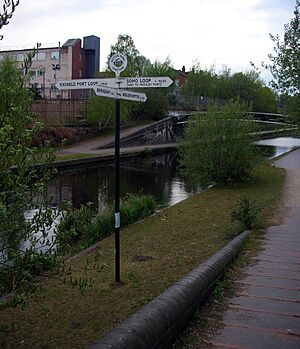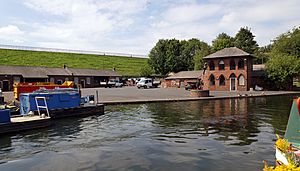Icknield Port Loop facts for kids
Quick facts for kids Icknield Port Loop |
|
|---|---|

Rotton Park Junction — the Icknield Port Loop runs through the bridge to the left
|
|
| Specifications | |
| Maximum height above sea level | 453 ft (138 m) (Birmingham Level) |
| Status | Open |
| Navigation authority | Canal and River Trust |
| History | |
| Date completed | 1769 |
The Icknield Port Loop is a short section of an old canal in Birmingham, England. It was originally called the Rotton Park Loop. This canal loop is about 0.6 miles (1 kilometer) long. It is part of the original BCN Main Line canal, which was built in the 1700s. The Icknield Port Loop opened for boats on November 6, 1769.
What is the Icknield Port Loop?
This canal loop is located about 2 miles (3 kilometers) west of Birmingham city centre. It's a curved part of the older canal system. In 1827, a straighter shortcut was built. This new section is called the New BCN Main Line. It is about 550 yards (500 meters) long. This shortcut helped boats travel faster without going around the loop.
The land inside the loop covers about 56 acres (23 hectares). Most of this land is no longer used. The canal itself helps the Canal & River Trust (which looks after canals) with their work. It carries water from Edgbaston Reservoir to the main canal system. You cannot walk or drive onto the land inside the loop.
The name "Icknield Port" comes from an old Roman road called Icknield Street. This ancient road passed somewhere nearby, but its exact path is not fully known today.
What is it used for today?
Today, the Icknield Port Loop is mainly used by the Canal & River Trust. They have a special depot there. A depot is like a workshop and storage area. Here, they keep equipment and do maintenance work on the canals. The buildings and a large crane at this depot are very old and important. They are listed as Grade II buildings. This means they are protected because of their historical value.
The canal also plays a role in managing water. It helps move water from the Edgbaston Reservoir into the wider canal network. This is important for keeping the canals at the right water level.
 | Aaron Henry |
 | T. R. M. Howard |
 | Jesse Jackson |



